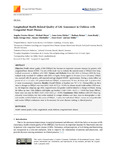Mostrar o rexistro simple do ítem
Longitudinal health-related quality of life assessment in children with congenital heart disease
| dc.contributor.author | Fuentes-Moure, Ángeles | |
| dc.contributor.author | Meyer, Michael | |
| dc.contributor.author | Häcker, Anna-Luisa | |
| dc.contributor.author | Reiner, Barbara | |
| dc.contributor.author | Brudy, Leon | |
| dc.contributor.author | Pértega-Díaz, Sonia | |
| dc.contributor.author | Oberhoffer, Renate | |
| dc.contributor.author | Ewert, Peter | |
| dc.contributor.author | Müller, Jan | |
| dc.date.accessioned | 2022-07-12T10:57:38Z | |
| dc.date.available | 2022-07-12T10:57:38Z | |
| dc.date.issued | 2020-09-07 | |
| dc.identifier.citation | Fuentes-Moure A, Meyer M, Häcker AL, Reiner B, Brudy L, Pértega-Díaz S, et al. Longitudinal health-related quality of life assessment in children with congenital heart disease. Congenit Heart Dis. 2020;15(4):217-227 | es_ES |
| dc.identifier.issn | 1747-079X | |
| dc.identifier.uri | http://hdl.handle.net/2183/31168 | |
| dc.description.abstract | [Abstract] Objective: Health-related quality of life (HRQoL) has become an important outcome measure for patients with congenital heart disease (CHD). The aim of this study was to evaluate the natural course of HRQoL from longitudinal assessment in children with CHD. Patients and Methods: From July 2014 to February 2020 this longitudinal study recruited 317 children with CHD (113 girls, 35.6%) aged 6 to 18 years (11.6 ± 2.9 years). HRQoL was assessed with the generic, self-reported and age-adapted KINDL® questionnaire. During a mean follow-up period of 2.2 ± 1.3 years, 195 patients had one HRQoL reassessment, 70 two, 40 three and 12 patients four or more re-assessment, respective. Results: Overall HRQoL at baseline was 78.7 ± 9.3. During follow-up there were no changes in HRQoL over time (0.03 [–0.01–0.07]; p = 0.195). In a linear mixed model neither CHD severity, the diagnostic subgroup, age, BMI, surgical history nor gender could be linked to a change in HRQoL during the follow-up time. Only children with higher age baseline (–0.48 [–0.85––0.11]; p = 0.010) had lower HRQoL. Same trend was seen for BMI (–0.19 [–0.41–0.03]; p = 0.099). Conclusion: Older children with CHD have significantly worse HRQoL, but they evolve similarly to younger children over time. Since no demographic or clinical variable could be linked to the course of HRQoL, it seems that individual HRQoL courses are not predictable and routine HRQoL evaluations seem to be necessary for acute decision making in clinical practice. | es_ES |
| dc.language.iso | eng | es_ES |
| dc.publisher | Tech Science Press | es_ES |
| dc.relation.uri | https://www.techscience.com/chd/v15n4/40124 | es_ES |
| dc.rights | Creative Commons Attribution 4.0 International License (CC-BY 4.0) | es_ES |
| dc.rights.uri | http://creativecommons.org/licenses/by/4.0/ | * |
| dc.subject | Health-related quality of life | es_ES |
| dc.subject | Longitudinal | es_ES |
| dc.subject | Serial | es_ES |
| dc.subject | Children | es_ES |
| dc.subject | Congenital heart disease | es_ES |
| dc.title | Longitudinal health-related quality of life assessment in children with congenital heart disease | es_ES |
| dc.type | journal article | es_ES |
| dc.rights.accessRights | open access | es_ES |
| UDC.journalTitle | Congenital Heart Disease | es_ES |
| UDC.volume | 15 | es_ES |
| UDC.issue | 4 | es_ES |
| UDC.startPage | 217 | es_ES |
| UDC.endPage | 227 | es_ES |
| UDC.coleccion | Investigación | es_ES |
| UDC.grupoInv | Epidemioloxía Clínica e Biotestatística (INIBIC) | es_ES |
| UDC.institutoCentro | INIBIC - Instituto de Investigacións Biomédicas de A Coruña | es_ES |
Ficheiros no ítem
Este ítem aparece na(s) seguinte(s) colección(s)
-
Investigación (FCS) [1293]






